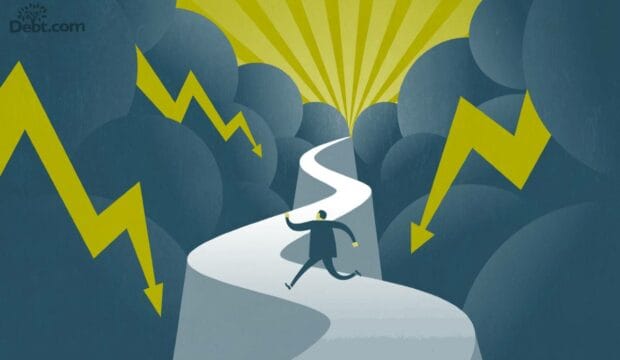Headlines may claim inflation is cooling, but the pressure on household budgets remains intense.
A new survey found that 46% say their income hasn’t kept pace with the rising cost of living. More than half (57%) report living paycheck to paycheck, up from 48% in 2016.
As prices remain high, many are turning to credit cards to fill the gap.
The study of 1,000 U.S. adults was conducted by Prosper, a platform that connects borrowers with individual investors. More than 3 in 5 (63%) credit card users say they can’t pay off their balances in full each month, compared to 45% in 2016.
“The results of our latest survey indicate that consumers are less confident about their finances than they were eight years ago,” said David Kimball, CEO of Prosper. “And less than half believe conditions will improve within the next five years.”
Inflation is still driving up debt
The global inflation spike began in early 2021. Since then, Americans have increasingly leaned on credit to manage rising costs.
The latest data from the Federal Reserve shows U.S. credit card balances reached a record $1.21 trillion as of Q3 2024, an increase of $45 billion over the previous quarter.
Debt.com has conducted its own surveys on consumer debt annually since 2018. According to the most recent findings, 37% of respondents reported relying on credit cards to make ends meet, and 32% stated they were maxed out.
“The challenge I see,” says Howard Dvorkin, CPA and chairman of Debt.com, “is that if people are maxed out from putting expenses on their credit cards, where do they turn?”
Prosper’s study also revealed that 36% of Americans have less than $1,000 in savings, leaving them vulnerable if an emergency strikes while their credit lines are already tapped.
“They’re going to have to make lifestyle changes to get ahead,” Dvorkin warns. “And if they don’t, they could end up in bankruptcy court.”
Do wages really lag behind inflation?
The numbers tell a more complex story. While many Americans feel like their income isn’t keeping up, data from the Bureau of Labor Statistics (BLS) shows that average hourly earnings rose by 4% year-over-year as of February 2024, while inflation rose by 2.9% over the same period.
Since January 2023, wage growth has outpaced inflation, meaning real wages – wages adjusted for inflation – have technically increased. But that hasn’t changed how people feel about their finances.
In Prosper’s survey, 45% said the economy has worsened over the past year. Several factors may explain this disconnect between data and perception:
- Essentials are still expensive. Although inflation has slowed, prices for groceries, rent, and gas remain higher than they were before the pandemic. According to the BLS, many of these increases have stuck.
- The impact isn’t equal. The Prosper study found that older adults and women are feeling the strain more acutely. Seventy-eight percent of adults aged 55 and older reported that their personal finances are the same as or worse than they were before the COVID-19 pandemic. Among women, 46% reported that they’re worse off financially, compared to 36% of men.
- Price hikes are more noticeable than wage gains. Consumers tend to remember what costs more, especially when they’re seeing it every week at the grocery store or gas station. Raises, if they come, are often delayed or feel small in comparison.
“It doesn’t matter what you say,” Dvorkin explains. “If there’s zero, or in a lot of cases, less than zero, in someone’s bank account at the end of the month, they’re going to freak out. And people are starting to freak out.”
The Prosper survey supports that. In 2016, 49% of respondents reported feeling confident in managing a major financial setback. By 2024, that figure had dropped to 42%.
“We have to get back to the basics,” Dvorkin says. “And the basics are: stop spending money you don’t have, figure out what’s necessary, and use your time wisely. If you need to balance your budget, pick up some side work or ask for more hours.”
If your debt has reached the point where you can’t manage it alone, professional help is available. Call for a free debt analysis. Certified financial professionals at Debt.com can walk you through your options and help you find the most effective path forward.












